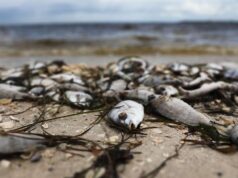
A mako shark caught on a line during a fishing competition.Photo: Getty
This week, conservation experts from around the world are meeting in Geneva for the triennial Convention on International Trade in Endangered Species conference of the parties. One of the highest-profile proposals is to provide protections for shortfin mako sharks, which are among the most common sharks caught for food. Yet in a bizarre twist, the U.S. and Canada, two western democracies widely considered to be global wildlife conservation good guys, are opposing the listing.
At this meeting, representatives from countries all over the world discuss a slew of conservation measures for internationally-traded species, which can include an Appendix I listing (total ban on all international trade) or an Appendix II listing (regulating international trade with sustainability requirements, but not banning it (here’s my 2016 explainer of this important event). So what gives?
First and foremost, there’s no scientific doubt that shortfin mako sharks are in deep trouble and need additional conservation. These sharks are severely overfished, they are newly assessed as “endangered” by the IUCN Red List, and their meat and fins are widely traded in international markets. They appear to be an ideal species to protect with a CITES listing under Appendix II, which would strictly regulate international trade in makos and mako products.
‘Ghost’ Fishing Gear Is a Bigger Threat to Sharks Than We Realized
Not even the oceans’ top predators can escape the ruinous embrace of humanity’s plastic waste,…
Read more Read
Like most sharks, mako sharks are vulnerable to overfishing because of their life history (they have relatively few offspring relatively late in life, relatively infrequently). They’re widely traded in international markets not only for their fins, but for their meat. If you’ve purchased shark steak at the seafood counter at your American grocery store, it was likely mako, thresher, or blacktip. Combined with their choice of habitat (often venturing into international waters where it’s harder to regulate fisheries), this is a recipe for trouble.
“Shortfin mako sharks face an uncertain future due to decades-long overfishing across major ocean regions,” David Sims, a professor of marine ecology at Plymouth’s Marine Biological Association Laboratory and the author of a recent paper on mako shark overfishing, told Earther. “The problem is that fishing mortality is too high, and has not been adequately controlled through management so far.”
“Shortfin mako sharks face an uncertain future due to decades-long overfishing across major ocean regions.”
While the U.S. has instituted some mako shark conservation measures, experts believe that more and stronger measures are needed to save this species. Conservationists believe that a CITES Appendix II listing is exactly what’s needed to help stop mako shark population declines. If governments can demonstrate that the mako meat they’re exporting was sustainably caught (via a technical document called a “non-detriment finding”), it will still be legal to export that mako meat—and CITES does not regulate domestic markets. But a listing will still help increase the regulation and sustainability of the global mako trade.
“A glaring lack of limits on mako fisheries take is leading to overfishing and a worldwide decreasing population trend,” Sonja Fordham, the president of Shark Advocates International, told Earther. “Listing these species on CITES Appendix II listing could improve fisheries and trade data, prompt much-needed fishing limits, and facilitate international cooperation toward comprehensive conservation, thereby increasing the chances for sustainable use. The precarious state of mako sharks represents a conservation emergency that warrants immediate, global action, starting with listing by CITES at this Conference of Parties and followed by science-based fishing limits around the world.”
So why are Canada and the U.S. opposing a listing of mako sharks on CITES Appendix II? As of this writing, representatives for the U.S. Fish and Wildlife Service did not respond to requests for comment and Fisheries Canada told Earther it “would be inappropriate” to comment on the vote that hasn’t taken place yet, though I would be remiss in not mentioning that despite clear evidence of mako shark population declines, mako sharks do not clear all of the bureaucratic hurdles for a listing. Regardless, this is troubling behavior from governments with a history of supporting global conservation efforts.
“It is deeply worrying to see two well-resourced countries totally abandon both scientific advice and their responsibilities to help countries without such resources, countries leading the mako proposal, to develop trade and management proposals for these sharks,” Luke Warwick, the associate director of the Wildlife Conservation Society’s shark and ray program, told Earther. “Despite receiving praise for banning the shark fin trade in the country, Canada looks set to oppose the mako shark listing at CITES. Canada appears happy to take shark conservation plaudits with a fin ban that’ll have limited impact, but the same fisheries department that announced the fin trade ban opposes measures that take a very basic step of encouraging sustainable trade for a globally endangered species.”
“It is deeply worrying to see two well-resourced countries totally abandon both scientific advice and their responsibilities to help countries without such resources.”
And while it’s perhaps not surprising to see the current U.S. government make an environmental policy decision that isn’t firmly grounded in science and ethics, conservationists who have long worked with the U.S. on international policy issues are still disappointed by this move.
“The U.S. has long been a global leader in securing CITES listings for sharks, promoting international shark fisheries management, rebuilding populations through science-based catch limits, and limiting mako fishing,” Fordham said. “News that the U.S. is leaning towards not supporting the CITES listing for mako sharks is deeply disappointing. Canada has made remarkable strides in shark conservation in recent years, which makes their opposition to the mako listing a significant setback that is dismaying to see. We urge the United States and Canada to take into account the alarming new projections for North Atlantic shortfin makos and reconsider supporting both CITES listings and domestic bans on fishermen retaining makos.”
David Shiffman is an interdisciplinary marine conservation biologist and science writer.
Source: gizmodo.com








